●
SATURDAY NIGHT IN APRIL
TWO LOVE POEMS FOR
KAREN
I. TALKING IN BED
I love when you fall
into bed that way
What are you
thinking
About getting old
Do you want me to
read you a poem
Sure
I knew you did
II. KAREN’S PINEAPPLE
UPSIDE DOWN CAKE
WITH MARASCHINO
CHERRIES
She waits twenty
minutes
after her cake comes
from the oven.
It’s one of those
family recipes
where you’re not
told
how to do anything
and when she turns
it over
onto the aluminum
foil
cookie sheet, she
says,
Oh, it turned out
just like my mother’s.
Jim Bodeen
13 April 2024
●
THE GROCERY LIST INCLUDES BUTTERMILK
Everybody owns their
own Holy Week.
Would you like to
sit with the poems of Mary Oliver?
You thought we did
that already?
Heavens no.
We were just trying
to wash
the matter from our
eyes.
And when Karen comes
to bed
I’ve been dozing,
and books
and papers have
fallen
to her side of the
bed.
She finds me like
this,
I’m a bit
sheepish,
pre-occupied,
so full of other
things
as the beloved
approaches.
Jim Bodeen
23 March 2024
●
THANKSGIVING LETTER TO KAREN
ON OUR 55TH ANNIVERSARY
I.
The turkey goes into the oven at 6:30.
This bird is stuffed. You left that cavity to me,
doing your own stuffing in the crock pot.
Corn bread stuffing from both of us.
You left out eggs from yours as an option.
I used two eggs and celery,
but let me tell you about mine—as it says
on the box, mine’s a corn bread mix,
not corn stuffing. Homestead style,
protein packed, Kodiac.
Frontier food restored. So add this
to the mix. This corn bread might raise
hell with the bird and the oven.
I don’t know what will happen,
even now.
Even before I put that turkey in the oven
the thought crossed my mind
like it does each year,
that I’m the turkey.
Man in the oven. Baste him
This is no confession.
Cook him in his own juice. Stick him with a fork..
I’ll be right back. I have to go peek.
II.
You’re saying Grace at dinner today.
I loved that Ann Lamott you read me yesterday
sitting in your butterscotch chair. We were trying on
those new support socks you ordered.
Putting them on, getting them over the heel.
They were too tight. Too long.
You talking about Lamott.
Her secret. Even at six she believed in God
in a family of athiests. She had that friend
growing up, they said prayers,
and she was hungry for every word.
Each part of her story that you told got better,
and we decided right then you would say grace
at our Thanksgiving table.
That saves me from becoming the Church Lady, too.
Karen, all of that stuffing wouldn’t fit
inside the turkey. I figured that out,
especially after adding celery and onions--
oh, and carrots, too. I split it up,
putting half of the mix in a loaf pan.
I have no idea what will happen.
You say Lamott grew up around alcohol
and unhappy grownups.
That’s how she became watchful.
Karen, how did you become the beloved?
III.
Last night in bed, just before turning out the light,
you said, There’s one more thing, she said,
speaking of our daughter, those twins,
those two blessings, does it matter which one
told you what? Only in the particulars,
but it was so beautiful. The love coming forth
from the daughters for their mothers.
You, Karen, recipient and seed
of the great Mother-love. I was reading a poem
at the time, a poem by the Canadian Robert Bringhurst.
It, too, was beautiful, and I gave it to you to read
because it seemed to be saying the same thing.
The same thing, but not saying it better than you said it,
not saying it better than our daughters said it either,
but giving us a chance to say it again,
repeating it, a balm, and another blessing.
These lines: We are what we dream of--
music and truth and some unfinished weaving.
Our fire has lasted, and like you said,
How could you tell anyone.
How would anybody believe it.
IV.
Even then I wasn’t ready for sleep Karen,
Did you get the title of the poem, too?
Look at it: How the Sunlight
Gets To Where It’s Going.
My God, it’s beautiful.
It’s beautiful again this morning.
And we did have some unfinished weaving
to talk about. You were coming home
from the store and I heard the garage door open,
and then the door to the kitchen.
Two doors open. And like it is in this house,
in this graced dwelling: Imagine,
having a garage! A house for the car!
Two doors open. And there you are.
Your fabric art on the dining room table.
A mountain scene memory photograph
woven into a wall hanging, with portraits
of grandchildren. Nearly completed,
but in a tough spot. Critical decisions.
Everything’s open, you said.
Consider everything, I’m listening.
The two doors. And we look again.
My stuffing’s been in the oven a long time.
It’s golden, but the toothpick doesn’t come out clean.
Is this corn bread? Is it stuffing?
Is it to die for? Those doors.
I know those doors open, those doors shut.
We look carefully at the art on the table.
We get out the photograph that delivered the dream.
We look again where we hadn’t looked close enough.
Here. Look here, at these lines. This shadow here.
How interesting up against those rocks.
Can that be shown in fabric?
The material you used here, my God.
And what’s small in the background comes forth.
It’s alive and carrying what’s easiest to see.
What we can see, but don’t.
We find all these possibilities.
You find them. We see things together
we haven’t even learned to see.
We draw again on separate sheets of paper
Can something be done with this?.
There are places in this beauty-weave
that must be practiced and learned
before you can finish. All of this beauty.
And that, too. That beauty, too.
V.
Check the turkey. Check the dressing.
Dressing itself. Dressing for the day.
Two dressings. Corn bread. Indigenous beauty bread.
That dressing’s been in the oven a long time.
It’s early, though. We have time.
Before family comes.
We set places for everybody.
A plate for everybody and nobody.
One way or another, they’re all here.
Tim’s on his mountain, but he’s not alone.
His cousin Julia’s with him.
He sent photos of them swimming
in a high country lake surrounded by snow.
Wet socks! He said, that. Wet socks!
Everybody here. Sig and Alice.
Your Mom, Dorothy. Your Dad.
My Mom and Dad.
Places at the Thanksgiving table
on our 55th Anniversary.
Love,
Jim
23 November 2023
●
IN THE BATHROOM
BRUSHING MY TEETH
LOOKING AT MY WIFE
IN THE MIRROR
What, she says.
I’m just looking
at your beauty
in the mirror
It doesn’t take me
long
to get tired of my
hair
Think about those
Republican
congressmen
in their suits
with their
comb-overs
Jim Bodeen
21
September 2023
54TH ANNIVERSARY POEM FOR KAREN
23 November 1968,
m.
I.
Walking into the
house singing
Love lifts you up,
you greet me
early morning, first
light,
saying, I don’t
need to go out
for breakfast. Happy
anniversary.
You mean, I say, I
get to make you, oatmeal,
here? You nod. I
walk over and press
each cold cheek to
your warm cheeks,
Brrr, you say, It
feels good.
II.
At table, your
garden corner,
blooming cactus,
looking out,
little brown birds
feeding
in Southern morning
sun
last leaves fall
from Autumn Blaze.
Kitchen time with
coffee.
The kitchen’s a
prayer center workshop,
I say to myself,
spreading coffee grounds
on Japanese Black
Maple.
You’re finishing
two quilts.
All Stacked Up,
Sunshine and Shade.
One of them you’ve
worked on for years
and will be on our
bed all winter.
You have a new
artist cane fully beaded
you purchased at an
art show
with our daughter,
it’s beautiful,
but it won’t do
you any good
when you carry it
like a purse.
I bring out the one
I made for my father
and we decide
together on trekking poles.
III.
We share these
anniversaries
with days of our
history.
President Kennedy’s
assassination on the 22d.
Our day on the 23d,
one day following,
and Thanksgiving,
sometimes before,
sometimes after. You
are the one
each one turns to.
One granddaughter
with a key to our
house, another
one come to help
decorate for holidays.
There are so many
parts to the day
There’s always
someone with a hammer,
you say to me,
adding,
This came to me as a
revelation,
but I realize it’s
from construction up the street.
And then asking me,
Do you have your
hearing aids in?
IV.
Too icy, cold, and
dark to walk the neighborhood
I find the Walmart
parking lot
returning with a
latte for you
from a coffee stand.
You live
with my walks in the
psalms of darkness.
There are no ‘musts’
in your life,
but I need to find
books to say it,
Must does not exist
here, No
room for this,
What must I do now?
You like the lunches
I fix.
Grateful you don’t
have to prepare dinner.
V.
You come to bed
and break into
laughter
as I grab your hand
and pull you in
locking thumbs
for a better grip
We let each other go
as our hands ready
themselves again,
we’re here now
and your head’s
on my chest
my right arm
around your back
my finger and thumb
finding that tired
spot
between your
shoulder blades
just below your neck
Right there, you
say,
between the bones
Sometimes I wonder
if I’m making this
marriage up
as I go along
Is it, I mean,
how could it be
this good for you,
Karen,
all these years
how could you ever
say it
Jim
23 November 2022–17
December 2022
*
LONG MARRIAGE
Sore left feet
Two of them
Two sore left feet
Two left feet sore
Two of them?
How is that
possible?
One is Karen’s
One is mine
Jim Bodeen
1 September 2022
BELOVED IN THE KITCHEN
Greeting my wife
with a kiss this
morning
as she comes into
the room
she whispers,
Go hike a mountain
Jim Bodeen
1 September 2022
*
NEARLY 8 AM ALREADY
and I sit with my
empty yogurt cup
looking at the Rilke
poem
from the Book of
Hours,
Part One, the
Monastic Life,
Karen’s name
written
in the margins,
talking
to myself as I read,
She who
reconciles the
ill-marked threads
of her life, and
weaves them gratefully
into a single
cloth--falling
into her blanket,
her sewing
machine
dream-humming
in my ear, it feels
given to me,
these poems to God,
come
first through the
muse.
As I write opening
lines
in the notebook,
returning
to the poem, I find
another
image of Karen, I
say, Here,
here I am the
partner
of her
loneliness. I have searched
the essential tombs
of monologues, have
discovered
nothing of her quiet
soliloquies--
that dash following
cloth,
like torn silk,
plain inner lining,
shiver of
extravagance
of the kimono.
--for Karen, midweek
in August,
2022,
Jim
*
MAKING BLUEBERRY LEMON SCONES
WITH KAREN ON SUMMER SOLSTICE
BEFORE OUR 53D ANNIVERSARY
I don’t know if you’ve made love
to a woman, I say to Karen,
taking a single berry from the prepared
pan of scones and placing
it between her tongue
and the roof of her mouth,
but this is what it’s like
making love with you.
Jim
22 June 2021
SOME OF WHAT CAN BE SAID
ON YOUR JANUARY BIRTHDAY,
KAREN,
We're still in bed when Tim
calls
New Year's morning. It's
early
before his work on the
mountain.
We're in our pajamas
talking about last night,
having
our first talk of the year.
Tim
says he'll call you tomorrow
on
your birthday. Your 75th.
We
watch quilters tell stories
with
fabric and color
on
American Quilters.
Tomorrow,
on your birthday,
we'll
drive to Seattle, see
Warren,
93, your brother-in-law; and
Aunt Phyllis,
101, a day
with
living ancestors. I watch
today
as I'll witness tomorrow,
you,
Karen, family matriarch,
wife
of 51 years. As I write
you
carry dishes to the kitchen,
Ahh, your
cry, and I know
you've
stepped on the ice cube
I
didn't pick up. Last night
we
fed our daughters, sons-in-law,
and
grand children pulled pork
and
cracked crab. We have
this
day to ourselves, one day
from
last year to your birthday.
We
practice this catch-up
like
we know what it is.
Watching
politicians on television
we're
drawn to their hair,
talking
about comb-overs,
disagreeing
even with the same definition.
This
is a new year, the Rose Bowl,
and
again we're in it.
I've
marinated Mexican shrimp
and
at half-time I'll put them in a pan
with
diced Serrano chiles, we'll sit at table
and
swath them in melted butter.
Tonight
we'll watch a movie.
I
love you to the barber's and back.
Jim
1
January 2020
GARDEN MORNING
After stone setting, after morning
meditation on beauty, after reading
Francisco Goldman's Ordinary Seaman,
a plane overhead, small one, single engine,
Karen calls me into bathroom
to buckle her necklace
and I say I'm supposed to kiss your neck
and interrupt your day
when
I kiss her neck, she turns
to kiss me all puckered up fresh
lipstick wet drying on my lips
drawing me two ways at once
I was
rubbing a stone
when I sat down in the garden chair
I had to put it down to write
what was coming up deep down
things, Karen's inner life, interrupting
the brushing of my teeth, mother
of the child with spinal bifida
on Facebook, baby taken off Medicare/
Medicaid because he's been in hospital
30 days--that's it, Buster--from now on
all expenses, KChing, KChing, Mom,
How does one write that poem?
I've been in the garden all day,
I've been kissing Karen on the neck
buckling her necklace, while she's
sewing tubies, fabric belts
of soft cotton flannel with giraffes
and foxes tan and brown, belts
over the baby's skin to keep tubes
coming from belly button
or stomach somehow, that's not
exactly accurate, it's messy lipstick
love, the child, the child, a fabric belt
with flaps and tunnels, guiding
and securing tubes. Earlier
this day, Karen shows me a video
of the baby, struggling to roll over
on his tummy, Oh! he'll get there,
he'll get there, he wants
to make it, to get there, so bad!
Can he laugh? I ask. He can smile,
she says. I come out from the bathroom
naked, shaken. I can't imagine
Karen in her sewing meditation,
what it feels like, for her, for this child
she knows through this soft belt
threading itself in her fingers,
me so all alone in a book,
a book too, of wonders,
in the garden, a garden day.
Jim Bodeen
14-28 June 2019
NATIVE SUN SUMMER
Dishing with Karen
Snow Giant Peach on ice cream
Spoon leaf fall moon glow
Jim Bodeen
24 September 2018
NEW SUMMER DRESS
Cutting out material
on the kitchen table,
dress pattern laid out
in afternoon light,
Karen follows the scissors
into a field of cotton flowers.
I come from the garden
through French doors
passing through one living
room to another. Later, my
feet on couch, pocketed
leather gloves soiling
furniture, watching soccer,
Karen enters the room
wearing her dress, hem
cut two lengths, bare skin
of her legs before me,
summer light coming through
cotton, gift of four decades,
with her question about fit.
Jim Bodeen
Summer Solstice, 2010
COLLABORATORS IN SILVER,
Karen, these lines are threads
running through your quilt,
dropped off at the post office,
and delivered in the mail.
These lines track threads
that make the story suitable
for what comes. These threads
bind us in genealogical mystery,
Biblical. Names written
on fabric with needles
in a tattooed time. Your name
in all of the poems.
Silver can be mined.
Devoted love aims at exhaustion.
Love, Jim
10 March 2017
PSALM FOR KAREN
Hear me out Karen
wife of all my days
everything good that I carry
anything containing any worth. Karen,
continuous dwelling
place of God,
who knows my protest
who knows everything coming from me
making claims of achievement,
who knows how wrong
it all sings,
in spite of your love
and hymn of devotion.
You, who wait with great patience
for the work to fail
and I come to my senses.
Only in my exhaustion
may the song come from God.
Jim Bodeen
12 December 2017
NYE BEACH WALK WITH KAREN
Karen in paisley dress, in sunshine
and wind, feet in sand, barefoot.
We were here 16 years ago this January
reading poems with Nye Beach writers.
"The Elizabeth Inn," Karen says,
"We could hear the surf from our room."
I remember, the morning of that reading,
it was dark. The inauguration
of George W. Bush. All those men
in long, black coats. Carrying those
images into the reading of poems,
it's one of my seminal images.
The morning after the reading
we walked the beach, and found
those large black stones, surf
swirling around them
as we searched for spots to stand on.
We took photographs of each other
looking out to sea, later framing them
in the collage frame from my sister.
We walk back again today,
retracing our story, stopping
at the Nye Beach Viet Nam Veteran's Memorial.
We read the poem, see ourselves
mirrored in the black stone
as we did then, as we saw ourselves
in the stone in Washington. It's so beautiful
what they did, mirroring ....?..
I fix tacos in the mothership
surrounded and cutting limes
without knowing where I am.
Karen says, "I'm going to ask a favor,"
startling me, "What?"
"Wipe the mice poop from the toilet paper door."
Jim Bodeen
14 September 2016
THE POEM THAT WISHES
FOR ITSELF AN ETERNITY
for Karen
on our 49th Anniversary
Karen, you've been with me
every day of the poem.
Before you, seeking the poem,
the poem is all I wanted,
I wanted to be a poet
but didn't know
what a poem was
or how to make one.
When you came
I knew it was you
knowing a poem
was in order, in fact,
an order, and a poem
was ordered. When
you came, the poem
came with you,
you were the poem
but I didn't know,
I knew but didn't know
knowing I didn't.
You embodied me
without my knowing.
I never made
what I found in you
finding out in time
that you made me.
Jim Bodeen
22 November 2017
HERE WE ARE
Highway lanes of sunshine
over the pass, Stuart Range fronting us,
we listen to Dylan
and Rolling Thunder Review
driving straight into 1975.
The water? It's wide.
I love to watch Karen
look at paintings in museums
finding her in new rooms.
Oh, how I didn't understand
all that was going on with Bob!
Karen, my one great mystery before me.
Wyeth in his search before us.
Thank God I didn't have to be handsome.
Or marry one who would be ambition
and beauty combined, bringing
Karen's beauty closer. This is beyond
the skin of desire. It raises the skin
on my arms, broken fences
in winter light. To pursue
what is never enough
in one's neighbors, I've
gone there. Stepping over
the line to get closer
with the camera, one viewing
me, says, You've stepped
over the line. I was yelled at
for doing the same thing.
Thank you, you better yell
at someone else. I'm
not yelling.
His wife is beautiful in that slender hat
crossing the canvas. Karen
hears the sound of music.
She shows me what she sees.
Have I broke closer to Karen?
Have I been collapsed as Wyeth?
Have my neighbors carried fear
at my approach? How have I paid others
to sit with me during the waiting?
Digital cameras help me see
what my eye cannot.
The danger in the museum.
50 years ago
Karen and I write daily letters
separated by a separating nation
and an ocean in a world at war.
Those letters are painted canvases
of a map we couldn't see was a map.
Jim Bodeen
7 January 2017
KAREN IS THE MOTHERSHIP AND THE GARDEN
Portland Japanese Garden with
Karen in the mothership
Cultural crossing with
children trying to find our way around Mt. Hood
Beauty and wisdom lie in the imperfections dry country High
desert
and asymmetry coming
down brakes burning
that time and nature imparts to all things and we're part of it We're a part
5.5 acres. five distinct garden styles and so many people
like flowers
When entering--desired effect to realize a sense of formality say, Japanese Black Pine
City neighborhood of
peace, harmony and tranquility--
part of nature. A living reflection of long history of Japan Say, North Dakota
Bullfrogs in a farmyard Shinto
Buddhist and Taoist philosophies,
there is always something more Pine Scales taking flight
What does this place do, the boy asks. Compositions of stone,
water and plants.
stones are the bones of the landscape.
So much sand sorrow
surfaces in a pair of boots water,
life giving force,
plants and people all wound up tapestry dreaming
pagodas, stone lanterns, water basins, arbor, bridge, and
cherries from coffee trees
the natural garden should not overpower the human BUT IT MIGHT
the human is part of this the
human part
Flat garden Flat
prose
strolling garden rolling
wheat fields
tea garden loaves
olive bread
natural garden succulent
caves
Steps and barricades sand
and stone garden
American Bonsai, the unbridled art of Ryan Neil
Framed by mature firs with Mt. Hood in the distance.
Neil, born and raised in the Rockie Mountains I remember the dinosaurs as a child.
Stories and books wind-swept trees in landscape of the American
West
Under the ozone, a horticulturistset out for Japan
and 6-year apprenticeship committing
to water and air
Green tea and cookies with
Bonsai Master Masahiko Kimura
Bonsai Mirai Where art
hangs the bridle on bent nails
So many new things from the ancestors trees ranging from 100 to 500 years old
On the chair lift talking with Sun River couple dANGLING sKIS
about Japanese Garden and Bonsai, dOSTEAVSKY given up for
lingerie
They said, "Well, it's much more natural here." pUT THE BONSAI on this bench here
Maybe, but put one of those trees of Ryan Neil beside your ski boot
on this chair and
we might consider the natural
world together.
jim
Portland Japanese Garden
2016
ON FIRST SEEING KAREN'S BANNER
QUILTED FOR THE WOMAN'S MARCH
OPPOSING THE INAUGURATION
When Karen's working on a quilt
I walk around the house
trying to look normal
and I have no idea what that
looks like. I'm watching Commodus
die by the slave's sword
when she walks into the room
holding Rainbows for a Snowy Day.
Jim Bodeen
12 January 2017
A COIN FOR KAREN ON HER BIRTHDAY
I reckon I got to
light out for the Territory ahead of the rest...
--Huck Finn
What you do with white water
in quilts makes me wonder
what you could do
with Mark Twain's hair.
The coin has two sides,
a portrait with wild hair
and a river from Twain's pipe
smoke on--flip it over
and there's Huck and Jim
on the raft on the Mississippi,
free and cramped
in a country of their own.
This piece of silver
minted in America
calls for your art.
It's yours, Karen,
if I might be the muse
asking for a quilt
during a crisis time.
Huck says,
All right, I'll go to
Hell,
following his
conscience
against his own upbringing--
if Jim can live free.
Huck and Jim are more alive
than American voters. Karen,
you're the only one I know
who can put this story
on a quilt. Huckleberry
on the Mississippi. The only Jim
I'd ever want to run with.
The raft is our Mothership,
we're all going together.
Mark Twain's hair as white water.
The coin sewn somewhere
into a pocket in your rich weave.
An American quilt
in the American grain.
Protest art sewn with your tight stitch.
Fabric with a story for grandchildren.
Love, Jim
2 January 2017
HOUSE BUILDER,
—for Karen on our 41st anniversary
Sister of Sifting Sand, shifting
in the year that cannot be put into words,
accompaniment with you
be my blessing this day. May I
know something of the door
opening for me as you walk down
the stairs this Monday morning
of thanksgiving. Sand into water
and cement be your name in concrete.
Ceremony in El
Salvador.
Each breath a counted gift lost
in countless acts of repetition.
Love,
Jim
23 November 2009
AT THE END OF THE DAY
—a love poem
In bed with Karen, and the sound
of a train going through a small town,
through this bedroom, right to us
in our altered states. Someone’s
left-over firecrackers
from the 4th of July snapping
bang, bang, bang, to get it over with.
Karen’s head rests in the crook of my arm.
Did you have a good week?
I’m kind of in a
trance when I’m here.
“Did you sleep in this house as a child—
I mean, this room?
This bed as a little girl?”
“No. Mary and Arvin didn’t live here then.
I’d stay with Aunt Marjorie, Mary’s mom,
or Aunt Edna, or one of my mom’s sisters.”
The embracing arms were all real.
They were looking for their sister’s eyes
in the brown-eyed child with curls—
the one who looked like them
but came from some other place.
You were already charmed.
How could they know the story?
This would be mine to discover.
Jim Bodeen
9 July—24 July, 2005
New Ross, Indiana—Yakima, Washington
JELLY
FOR KAREN'S VESTS
This
is the jelly that responds to questions.
My
wife, the maker of the sacred vests,
just
walked out the door, on her way
to
her first show. Will my vests walk
out the door? Am
I an artist or a craftswoman?
We've
been talking about these questions
for
the past month. Making me beautiful
in
the eyes of the world has brought forth
her
desire. Now she has the questions
that
poison creators.
Jelly-making
is a craft. Jelly poems are crafted.
Dipping
the vest in hot jelly, that's art.
Jim
Bodeen
November
20, 1999
TWO WOMEN SINGING FOR YOU
Part II —
The Gifts
—for Karen at 61
Picking up fresh crab for New Year’s Eve,
I ask Ted Klingele what music he’s listening to
these days. Ted, 41, former student, plays in a band.
Susan Tedeschi, he says, Just Won’t Burn.
Blues, Rock and Roll. Writes her own songs
and plays her own guitar. Ted, I say,
a good choice for Karen’s birthday?
She’s hip, sure, Ted says. And just
won’t burn, I think, crossing the street
to Off the Record, remembering too,
the story we read together
of the Lummi Nation burning
a drug house to the ground,
a house that wouldn’t burn that needed to.
You’ll find her in blues, the young man tells me.
And there she is in orange corduroy
and cartoon stickers on her guitar,
singing Rock Me Right
and You Need to Be with Me.
On the way to the cashier I see Aretha
in the used bin looking just like new,
Under Her Spell, singing songs
we’ve grown up with—
I Say A Little Prayer, Aint No Way,
and Bridge Over Troubled Water.
Karen’s reach is this great, I say to myself.
Susan Tedeschi to Aretha Franklin,
spanning time, holding things together,
letting them go. She’s that hip,
I say to myself getting in the Jeep.
Karen burns, and she doesn’t.
The privilege of her mystery
that’s mine to watch, everyday
over time, all music.
Love, and more days and years full of birth days.
Jim
2 January 2006
SUNDAY IN HANOI
WITH KAREN
After breakfast we take a taxi
To the Temple
of Literature, bombed out
During the wars and rebuilt. We walk through
The red doors and walked through them again.
I stand in the doorway surrounded by all this red—
Red doors, red door frames, red shadows
From sunlight passing through a red entranceway.
We stop and talk to the children and photograph them
And they surround us with questions—their teacher
Has given them questions to ask—we laugh together
As we look at instant images of all of us
In this ancient place built for poetry.
Karen and I take pictures of each other in front of the
doors.
The red doors are an investment.
Study like it’s all being taken away, Confucius says.
Review what you have learned and study anew
And you are fit to be a teacher, Confucius says.
Alberto and Armida walk with us through the gates
From Columbia,
they began belonging to two places
And now they walk into this.
Turtles and Stellae were buried in sand for protection
During the bombing. Sand will never be the same.
Seeing these turtles, I too become a parable.
Karen wants a bag made by the Hmong people
And we wave goodbye to our new friends, walking again.
I buy two dolls, a man and a woman, dressed traditionally
In colors woven by hand. We walk the streets of Hanoi
Looking for silk, looking for coffee, the right piece of
jade.
Lost now, two cyclos promise a new way
And we eat baguettes on the street as they pedal us
Through market streets teeming with people.
We have seen the movie the people can’t see.
We know just this much of our privilege.
We drink Vietnamese coffee and a fruit smoothie.
Karen finds three silk shirts for Todd,
Steven and Tim.
I buy coffee for friends. It is Sunday we are in
shirtsleeves
In Hanoi,
the city of a thousand years.
We carry two cameras and take 200 pictures.
We walk around the lakes and the many parks
Until we get lost and sit by two men enjoying the day
On the park bench. We talk to each other
In different languages and laugh. Only our laughter
Is understood. We will take a taxi each time
We get this lost and we will take three taxis.
We will get the taxis lost too. Karen
Will show them a map and we’ll laugh again.
Karen knows when to take out the map.
We eat ice cream on the street
And Karen photographs me with two monks
Walking outside of the pagoda
Near where John McCain fell from the sky
In his parachute. I will watch two boys fishing
From the sidewalk, the one boy wearing
A blue jean jacket that says Reebok.
We greet everyone who looks at us and smile.
Confucius smiles at us in approval.
Karen wants to enter the pagoda.
We lose each other walking around the Buddha.
Karen has her nails done.
I get a hair cut on the street.
Two old men make me very happy
Standing beside me while Karen takes pictures.
Karen and I have been holding hands
Walking in cities for more than 40 years.
I rub her feet with lotion in the hotel room
While she reads to me from Confucius.
Look at the surface but see the meaning behind.
We know we have to pack our bags tonight.
We do not go to the mausoleum to see Ho Chi Minh.
But Hung, our guide, tells us Ho is back, and rested.
He vacations each year in Russia. He goes for two months.
He’s back and looks good. Every time we cross a bridge
I remind myself I’m in Hanoi.
We think of the revolution,
And Uncle Ho reading Thomas Jefferson,
And we say, Yes. It has been days since I talked
With my children. 40 years ago I was here,
In the South. Karen was 9,000 miles away.
I wrote to her every day and she wrote to me.
I said to her in the letters, I want to be your husband.
It is the only thing that I want in life.
You and the poem are one.
You are the only one that matters to me.
You. I will build a life with you.
We will build it around literature.
Literature will make me possible for you.
Jim Bodeen
30 November 2008
ON THE EVE OF OUR 38TH ANNIVERSARY
You’re brushing your teeth when I come upstairs
Into the newly painted bathroom. We’ve been clearing
Out rooms to live in—our children gone—grandkids coming in,
And even so, this house is big again. You’re looking
Into the mirror, toothpaste everywhere, and I start
A story about the young man at Salvation Army
Who checks in donations. “Check out the music
In the box before you check it into the women
In the basement,” I say, “There’s some good stuff.”
“You brought me Burt Reynolds last week,” he counters.
Mother’s music in my Jeep, and he remembers.
Your laughter is always better than my jokes.
“Why did we get married November 23d?”
I’d asked earlier. “We thought everyone
Would be home from school,” you said.
“You chose that day?” I asked.
“I suppose I did.” “Pretty funny,” I added.
Tomorrow is Thanksgiving. Our anniversary.
One of your daughters is cooking the turkey.
The other’s bringing pies. Your son’s in Seattle,
Happy and working. His voice cracks on his taped
Phone message. He’ll miss this meal, too.
Our mother’s in Yakima
bringing me
My life story. You’re reading me
For Better Or Worse, your favorite comic strip.
We did build this family on a model
Provided by Life Magazine.
We didn’t know it. Live it out
Outliving it at the same time.
You’re out of the bank 8 months,
Two months from Social Security.
For your birthday in January,
I’m getting you the Senior Lifetime
Pass
To our National Parks. Playgrounds
For grandchildren and grandparents.
This has been the year of Katie & Joshua.
I watch you work with what you waited for,
Witness your love bring curiosity and personhood
Into our home, a version of the world worthy
Of duplication. You’re the teacher, here,
And I’m your backup, our first year home together.
On the eve of this day, we sit before the television
On new love seats, gifts to each other,
Watching Criminal Minds, wondering how
Our nation turned to torture. “Here, they question
Through story, not humiliation,” you say.
How different from Donald Rumsfeld, living
By personal choice in a house of horror,
Mount Misery in Maryland,
where
Edward Covey, a slave breaker,
Had has infamous shot at Frederick Douglass.
We’re grandparents in house exile, raising babies
To be free in a hijacked democracy.
You mix a teaspoon of horseradish into cranberries,
Stand before me, between your own children,
Radical citizens of this house, and babies
Learning to share toys. We promise
To talk about this day tomorrow.
Love,
Jim
November 23, 2006
Thanksgiving
READING ME THE COMICS
Karen laughs at Doonesbury.
He’s going after Donald Trump
And George Bush.
“What?” I say,
Because she’s given me so much already
This morning. She reads me two items
Pertaining to the elderly, and those
Who live with them: First this:
“A man who used a stun gun on his
79 year-old grandmother-in-law
After an argument over how to discipline
His baby son was arrested for investigation
Of domestic violence assault. After an argument
That lasted several minutes, he pulled out
His Taser stun gun and told her he would use it
On her if she didn’t leave within 60 seconds.
He counted down, and when she didn’t leave,
He shocked her on her right shoulder
As she sat on the couch.” And this obituary—
“It must have been written by John,”
Karen says before reading, “He took
His mother everywhere.” Edith
Stiles Baule
Died unexpectedly on
Thursday morning,
January 25, 2007 at
the age of 91 years
5 months—thereby
surpassing her longtime
Goal of living to 90.
She would have
Enjoyed telling people
that her demise
Occurred peacefully in
the midst
Of her morning shower,
thereby enabling
Her to reveal to one
and all
That she died clean! Two
moments
From the day, before the day
From Karen, bring me to the page.
WINDSHIELD IN WET SNOW
In the Jeep outside the restaurant
at White Pass, wet snow falling heavy
and wind-driven, a poem of Jack Gilbert’s
recalls his lost love for Michiko,
the body’s inability to remember,
and the heart’s inability to forget.
I think of you in your last days
at the bank, Karen, and what I know
of great lovers in literature.
I wanted that as much
as I wanted the poem. I found that
love in you. As outrageous as saying,
You’re mine.
You remain mystery,
mysterious and companion, over time.
Others replace lost love
from necessity or pleasure, and I wish them
good life and God’s speed.
I celebrate what they have found.
Returning to you from this weather,
I ask for nothing more, nothing.
I would never again try balance,
nor ever want composure.
Jim Bodeen
11 January 2006
VIETNAM ANNIVERSARY
Curtis Stigers’’ You Inspire Me, from Bob Dylan’s,
It ain’t me Babe, the organ solo making it impossible
To cut the engine in the hotel parking lot. Oh, song
Without end, you won’t let me out of the car.
The two of us sick and getting sicker,
Coming back from a play at the Seattle Rep,
You driving out of traffic through Queen Anne
After the play, showing off what you know about
Managing Seattle
traffic, seeing 3d Avenue
Where you grew up from the other side
above the hill, Ballard of Sweden and Norway.
White-robed Lutherans, and Woodland Park Zoo.
I never could figure out the Bay of
Pigs
We were faced with it tonight. I still over-read
When I come on it in news stories. I slow my reading,
Maybe this time, you talking about junior high friends,
Linda Batista and her boyfriend Castro,
Junior high school kids laughing at what they think
They know. Forty three years ago on our first date,
At the theatre, Try to Remember. The young man,
Taking off and leaving, in the Fantastiks, how we began
Together at 19, how I ran, the kind of September
In the first New
Orleans hurricane. Tonight we’re watching
Cuba in Seattle wound tight with
43 years of story.
There’s war, too, in those 43 years. And I’m trying
To read the last pages of a novel. You’re with me
In the doctor’s office and I’ve got a bad esophagus.
That’s why we’re here. We’re with the specialists,
In Seattle,
and there’s trouble in the throat.
A woman comes in and sits down opposite us,
You’re reading Denis
Johnson, I love Denis Johnson.
I taught Jesus’ Son in
high school. Have you read it?
Johnson is an
uncomfortable read. Yes he is.
We’re here to see the same doctors, with the same
Bad throat. Too much talking. Too much trouble.
Jesus’ son going to get us all in trouble. Same-same
For Tree of Smoke.
Tree of truth that’s there
And it’s not. Looks like the mushroom coming off
The desert floor. And just that fast I’m back in the Nam.
You want to look at poinsettias and Christmas decorations,
Say you know a nursery that’s full of trails.
Where? I ask and you say, and I repeat the name,
Missing a syllable. I hear a shortened word,
And it becomes rhymed to another
In my mind, then connected to a voice,
And another world. Mobeck, Mobeck,
I say, Mo Beck, Mo Muck, Mo Fuck.
And I’m no longer shopping for poinsettias,
At a garden party, Ricky Nelson. This is the Nam.
I’m listening to tunnel talk and Black Man.
Black Man talking to the Lieutenant,
Cherry Loot, telling him how it is, how after
The bullshit burns away, one wants deeper, not out.
Take me there, and start talking about Black Man.
Excuse me, I ask a couple, Where are the trails?
Happy anniversary. I didn’t quite come back from war.
Nobody does, and the country,
Whatever it was, is not the same. Black Man
It turns out, has a first name, it’s Charles.
All the bull shit gets burned away
In Johnson. He wants to die by truth,
Or for it, in search of it, frozen in it.
Sitting with GI on the plane full of soldiers.
We don’t know we’re going to Vietnam
when this scene happens. I don’t know these
lines exist, find them looking for last night’s notes.
Jim Bodeen
November, 2008
TRANSPORTATION
Am I on my way to Heaven?
Or trying to board the last helicopter
leaving the embassy’s roof in Saigon?
This has ever been my problem, Valentine.
Waiting for you to come out of the bank
for the last time after 40 years,
I can’t tell you how happy I am
to hear that the boardroom bores.
Waiting for you on Valentine’s,
I hunker down with KPLU jazz,
give our grandson a bottle,
rocking away the morning.
The day is gray, gray, gray,
but the piano player is oblivious
to every external detail.
I listen for you in his tracks.
Love,
Jim
Feb 14, 2006
KAREN’S BABY BOOK
Talking resemblances
In the babies’ ancestors
Talk comes around to Karen.
“I think Sammie looks like you,”
Someone says to Karen.
I ask for ones connecting her
To her mother, Dorothy.
“You carry her face in your face,”
I say, remembering Shakespeare.
“You had the children that saved
Your mother’s face.” The baby book
Is white, mock leather, torn away
At the corners, stuffed, padded,
Cardboard stiff with a broken spine.
Three strips of contact photos
Of Karen just able to sit up,
Looking both ways, in a dress
Made of ribbons worn for the photographer.
Nobody knows what’s coming, nobody.
The poem by Edward Guest
Says only, …Send
either one
If it can’t be twins.
Mother Dorothy writes in Karen’s voice
Of her first outing in January:
“I’m three weeks old today.
Momma & Mrs. Bertrand took me to the store
With them. They walked around and carried me
From the corner to the parking lot
To get Daddy’s car. I slept so good
In the fresh air.” A lock of Karen’s hair,
Carefully curled, held fast for 63 years
With a tiny piece of well-placed tape,
Preserving a mother’s dream. The record
Of her growth and weight, ends at nine months.
First words: Da Da, By Bye, Nigh Nigh,
Ma Ma. And the last entry: first tooth—
Nov. 25th
at 10 months, 22 days.
Dorothy will be dead in 17 days.
The virus will strike that fast.
“Who saved your baby book?”
I ask Karen. “I don’t know
If it was in Mother’s Hope Chest or not,”
She says. We talk in the kitchen
Of her love, grateful for knowing
When that first tooth arrived,
Seeing how carefully her Mother
Watched her grow,
And that lock of hair.
Jim Bodeen
8 December 2008
AT THE END OF THE DAY
—a love poem
In bed with Karen, and the sound
of a train going through a small town,
through this bedroom, right to us
in our altered states. Someone’s
left-over firecrackers
from the 4th of July snapping
bang, bang, bang, to get it over with.
Karen’s head rests in the crook of my arm.
Did you have a good week?
I’m kind of in a
trance when I’m here.
“Did you sleep in this house as a child—
I mean, this room?
This bed as a little girl?”
“No. Mary and Arvin didn’t live here then.
I’d stay with Aunt Marjorie, Mary’s mom,
or Aunt Edna, or one of my mom’s sisters.”
The embracing arms were all real.
They were looking for their sister’s eyes
in the brown-eyed child with curls—
the one who looked like them
but came from some other place.
You were already charmed.
How could they know the story?
This would be mine to discover.
Jim Bodeen
9 July—24 July, 2005
New Ross, Indiana—Yakima, Washington
HOLLYHOCK DOLLS
—for Elaine
& Karen
Pinch the blossom at the stem.
Upside down, the multi-layered
bodice of green leaves,
covers the modern woman
and the antebellum debutante.
Eight petals sweep the dance floor.
Now take just the bud
and pinch it, carefully
leaving the stem in place.
Poke the stem
into the upturned blossom.
Her face glows.
Her two eyes, demur—
natural and wild.
This turbaned woman
lines driveways, coy
about her alley roots.
Pinch another blossom
to give her skirts
South of the Border Color.
Women love these fleeting moments.
Young girls take their cues
from their grandmothers
showing them how
to dress, and play, and be.
Jim Bodeen
July 16, 2005
ON THE EVE OF OUR 32ND ANNIVERSARY
for
Karen
The coffee table is set for you.
Flowers and a pillow to dream on.
I've been to Safeway and now I'm at the Y.
I'm swimming. Our family gathers
tomorrow to be grateful at Thanksgiving.
Fated to each other and this day,
we will sit with the others
and be mostly quiet. We will listen
while everyone tells how it is.
And we will receive their congratulations
for our years. Among those at the table,
we've been at this experiment the longest.
We know something of the journey
before each of them. We know
how little we know. We're beginners.
Our love shows. This terrifies.
Love,
Jim
LUCKY MAN CAMPGROUND
Karen crawls into bed in the covered wagon
still looking for a name, Maybe kuna ya ya,
Mixteco for little
trail opening after Manuh.
The shower’s up, portable toilet working,
Whidbey Island Coffee ready to go in the morning.
Sister Sadie Sadie’s settled in at the foot of the bed.
Karen and I open camping at South Whidbey
State Park.
There may be one other camper. We may be alone.
At a poetry reading called Burning Word,
I hear the poets calling. Someone
suggests
Charles Potts for first poet laureate of the State.
Charles says, No, having read the job description.
Ed Stover, who lobbied the State Legislature
For months, on his own dime, must have winced.
Still, I’m with Charles on this one. Ed himself says
Republicans in Yakima are all asking him
To write poems for fallen comrades.
There’s a light rain. This tent’s covered and warm.
Naomi Shihab Nye reads a couple of notebook poems
Like this one. I copy down some lines.
I like the one about our buddies all over the world,
The poem for her brother arrests me.
Typing will help you
get through it,
Naomi says. Who else
should you be typing to?
Who else is on his way
out?
I love these lines, this evening.
They were worth driving seven hours for—
Seven hours, a ferry ride, and 181 miles, as Karen says.
I didn’t know which lines they’d be, driving here,
Judith, Derek, Naomi—speak for us all.
Karen has her picture taken with Naomi.
I write some lines for Terry
In Lorca’s duende
book I’ll give her tomorrow.
I’m a lucky man in a burning world.
Jim Bodeen
April 28, 2007
HE’S SAFE
Karen drives. Getting in beside her,
Mom says, “I can sit in the back,”
As I buckle her in. “Jim can sit
In the back,” Karen says, smiling.
“That’s where Jim rides.”
“You sure have a nice car.
This is Karen’s car, isn’t it?”
“That’s right. I got this car
To carry the grandkids,”
Karen says. I look at the car seats
Beside me, two of them,
And one space left for me.
It’s Mother’s Day,
And the mothers
Sit up front. It’s nothing
New, though, that I ride
In back. I always ride in back.
What’s new is Karen’s car,
The car seats, and these
Child-proofed doors.
I’m locked in back here,
And knowing it,
Doesn’t help me remember.
“You don’t have much wind
Over here,” Mom says,
“like we do in Seattle.”
Mom tells us this on Sundays.
When we get to our daughter’s,
Where we’ll celebrate the mothers
With a meal, Karen pulls up.
I’m pulling on the handle
And nothing’s happening.
“You’ll have to help Jim
Out of the car,” Karen says
Unbuckling Mom, looking
Back at me. “Jim is child-proofed.”
“He’s safe,” Mom says.
“He’s safe,” Karen says.
May 11, 2008
DANCING WITH KAREN AT THE BANK CHRISTMAS PARTY:
LINES FOR FRIENDS AND WORKERS ON KAREN’S RETIREMENT
Karen’s been with you as long as she’s been with me.
We’ve been watching her, you and I, across four decades.
What Karen means to you she means to me.
What she gives to you is constant, and what I also know.
Who she is with you is the same person she is in our home.
In a sense, your loss is my loss, too. I know what it is
you’re losing.
At a Christmas Party, dancing after dinner,
Karen looked around, and said, “It makes me feel so good
looking at all these people. I helped create a part
of their beginnings at the bank. I was part
of how each got started here.” Each Christmas
I became part of that, too, how you played and worked,
mix of soul and story Karen brought home each night.
Karen gives what Karen has. She doesn’t parcel out her love.
She says, “I’m ready for what the day brings,” at work or
home.
When I see her taking phone calls from our kids,
this is how she answers the doorbell for Suzi’s kids at
Halloween.
We met in 1964. Karen as a bank teller in Seattle,
a Sunday School teachers. She sang in the choir.
Her boy friend was the left-handed pastor’s son.
Years later, deeper into marriage, I’d discover
every boyfriend Karen ever had was left handed.
I came home from Viet Nam in 1968.
Karen put me through school working in a bank.
Her quietness remained a mystery.
I never matched, or understood.
It became her great gift, and even in mystery
remains her great question: How she turns
what’s quiet into facts of love witnessed by all.
Karen taught me the bank was about people.
She read me obituaries of customers.
She told me how customers had favorite tellers,
how only certain ones could wait on certain people.
I ate fresh cherries they brought in each year.
Karen taught me the importance of staying balanced,
a man who doesn’t know a thing about money.
We lived and worked with the same person.
Sometimes stubborn, she doesn’t eat her vegetables
at lunch with you either.
She let the fool in me flash and burn.
She taught me how much we had,
and what I didn’t. She never pointed
fingers, or judged. Somehow I just knew.
She helped me see myself, more clear.
She listens, teaching me to listen.
She teaches us that listening is making love.
When Karen laughs I know something missing in me.
She reads me For Better and Worse in the funnies.
She explains what I can’t understand.
She never gives up on me catching on.
When she laughs from the other room,
I know how much I have to learn.
She knows your stories, and you know hers.
I’ve never met a more accepting person in my life.
Not one, like Karen, who turns the drier over
when the felt breaks to fix it.
She loved her job.
She loved the power that came with it.
But only in how it help her do what’s right.
Her politics, goodness and mercy, cross party lines.
Karen does what’s right, not afraid of what’s just.
What you see is what you get.
And that’s what I get too.
Jim Bodeen
1 April 2006
THIRTIETH ANNIVERSARY JELLY
—“You look at me, you give
A light, which I hear and return,
And we are held…” Wendell Berry
What this kitchen knows,
Karen,
Is all sealed tight in this
jelly—the lids
Have all popped, it’s safe.
And once more,
Cleaning up, we shine in
light
We carry—but we did not make.
We will make of ourselves,
gifts.
Where you turn into me
Can no longer be seen. Where
I
Am you, an angel, and more,
Is known by me. The fallen
grapes
Tracking down the hall on the
rug
Are under my shoes.
Jim
November 23, 1998
KAREN’S GIFT: REMEMBERED ON A BUS
LEAVING LA CUESTITA, MICHOACAN
An album of photos in two parts.
First pages contain photos
of the people in La Cuestita,
the photos Rob and I took in July,
family photos of the rancho
never before taken.
The second part contains
photos of family members
in Yakima, at our back yard
having a picnic, a pa’changa—
everyone looking good,
remembering La
Cuestita
in the photos. These photos
show them writing names
on the backs of pictures,
remember and witness.
These photos say,
We made safe journey.
They deny, for the time
it takes to snap a picture
or the time spent looking at it,
all the fears created
by political borders.
These photos show grandchildren
doing well in school.
Rafael takes the album
from Karen’s hands
and makes another story.
He walks the photos
through the rancho
knocking on doors.
People come into the street
to see. He shows everyone
the photos of themselves,
and the photos of their children.
November 21, 2004
MORNING STORY
Each morning is for you.
For this I have quit teaching the children.
Listening changed my life
and brought me to you.
As I write your name
I hear the dog chewing on her bone,
cleaning her teeth, and I know
you are there. In the August watermelon
I cut for Karen and the cantaloupe, too.
Storypath,
Cuentocamino,
I don’t leave home to find you.
I am lonely wherever I go.
You are the true subject.
I find you in the roses I cut for Karen,
and in those weeds calling me
to your beauty. Mine is the privilege
of the anointed. When I don’t know,
I’ve been given permission to ask.
Tenemos la
responsibilidad de cada uno
de nosotros. I
asked for that
and this morning I practice saying it.
Jim Bodeen
August 19, 2004
JELLY
FOR THE MAKER OF THE VESTS
It's
more than following a pattern
and
skill with a machine—it's a way
into
your quiet heart—that's partly
why
I get interested. It's more than
my
interest in looking good,
or
dressing up in the sacred and ceremonial.
I
followed you for your story
and
now your story comes out in clothes
for
others. The test in this jelly
is
in its color, pressed from its dark dark
skin.
The clarity comes from the color,
the
color of truth, as certain as your good stitch.
Jim
Bodeen
November
20, 1999
A SONNET FOR KAREN ON VALENTINE'S
Two candles on the dinner table.
Two plates, and the two of us. One pudding
with two spoons. Three translations
of Paul, both of us questioning modern
scholars.
Our children have their own lives.
Proud of that, still we had flowers and
chocolate.
Scholars want us to punish our bodies.
We're still remembering last night.
I know you again this morning ringing bells.
You ring a message from a far place
I can only guess at in poems.
You are the only spoken word I seek.
A ringing bell calling children
to the world. Peacemaker. Nothing but love.
Love,
Jim
February 14, 2000
A LETTER, IN MY OWN RETIREMENT,
TO POPE JOHN XXIII, THANKING HIM
We were two of so many, Karen and I.
It would take our take our lifetime to know,
And a lifetime to understand.
We were in high school.
Neither one of us knew a thing about you.
We didn’t know each other.
We would meet and spend our lives together.
You were already sick with cancer
When you called for the Council.
We were entering our senior year of high school.
You would die the week we graduated.
Karen and I still haven’t met.
Cuba,
Khrushchev, and Kennedy. We knew of that.
I didn’t know you were a part of it
Until this morning after Church
Finishing your biography
When I told Karen of your note to Khrushchev
Early in our marriage,
Five years into it, lost and looking—I mean
We were part of the sixties, too—for what you called for,
Saved, and made, our lives. Call me child of Vatican II.
Call our marriage saved because of what you
Opened up and gave us. Young Lutherans,
Living in community studying our own roots
In the room you opened for all—
Not knowing your common name, Angelo.
Angelo Guiseppe Roncalli, il papa buono,
The good Pope. Discerning the sign of the times,
for separated brethren, the whole world is my family.
Pacem in Terris.
Peace on Earth. Holy Week, 1963.
Your Council opened 12 October 1962.
You talking under your breath, I know my part,
My part will be
suffering.
And
me.
The last you’d be expected to know about
Or pray for. A North Dakota
town boy
Already full of prejudice. Later, after marriage,
After war, I sat in the classroom
you created, surrounded by priests and nuns,
daring my questions to be answered,
and they were. Unprepared for candor
and truth, I would spend another 20 years,
trapped in the limited freedom of self.
You will already have written in your notebook:
Criticism for me is
light, is truth, and there is only
One truth—the supreme
truth of Christ
Cannot ultimately be
in conflict with other truths.
I will carry a version of this sentence—from you--
As a fragile foundation—Does
he really mean it?
And, Can I? clear
to here, the beginning of this poem,
15 April 2008.
After
coffee with Karen,
When she read me the story of Terry Allen’s
Storytelling, I pick up the biography of John XXIII,
When he was still Angelo,
But in his 60s and an archbishop in Bulgaria.
I’m looking for one thing to carry with me
While I sit with the poet, later.
The poet will talk of rejection.
It’s good, but different, than renunciation.
For you the cross could be loved.
For those open arms
have been the program
Of my pontificate. Fragments
I put in here from biographers,
John’s favored style
was to reclaim pieces of the past
That could be made to
serve bold new patterns in the present,
Are broken pieces of words in my notebook.
What John XXIII learned from Bernard of Clairvaux—
The life of the world
will continue after each of our deaths,
And the future is in
God’s hands, so there is no need to be
Curious and anxious,
is a shard I look at in the morning garden.
Thirty years of poems try to tell what I’ve been given.
I didn’t know how much of it came from you.
Father, You gave me all. I’m one of the ones
Who must be imagined. I write.
From the source of my gratitude.
Jim Bodeen
15 April 2008
FOLLOW KAREN, JIM,
Our second step is
achieved when one thinks not about pleasing himself but instead follows the
injunction of the Lord, ‘I came…not to do my own will but the will of the one
who sent me’ Jn. 6:38 Rule of St. Benedict
That’s all you have to do, keep your eyes on her,
For she is Christ making your sweet life real.
She makes it possible to kneel before the poem
With a straight face. Take yesterday,
When you wouldn’t pick up the phone
Because you were listening at the table.
It took you long enough to be quiet.
That was Jesus in the kitchen.
It’s good to sit with men reading poems.
The poem will never be worth a damn
If it depends upon your will.
Bringing devotion to the table is the poet’s task.
Jim Bodeen
14 March 2008




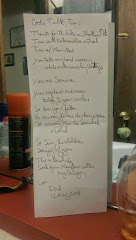
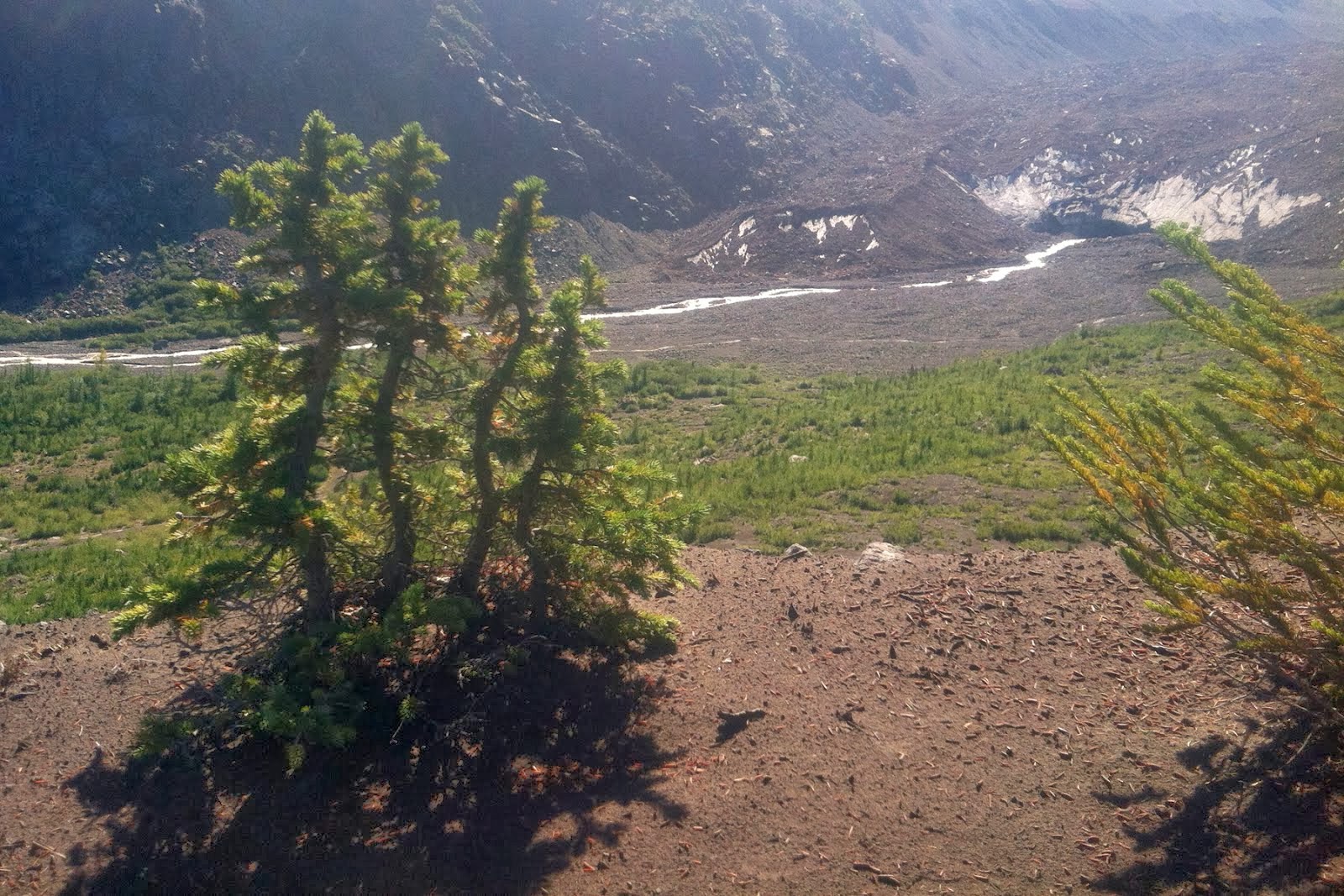
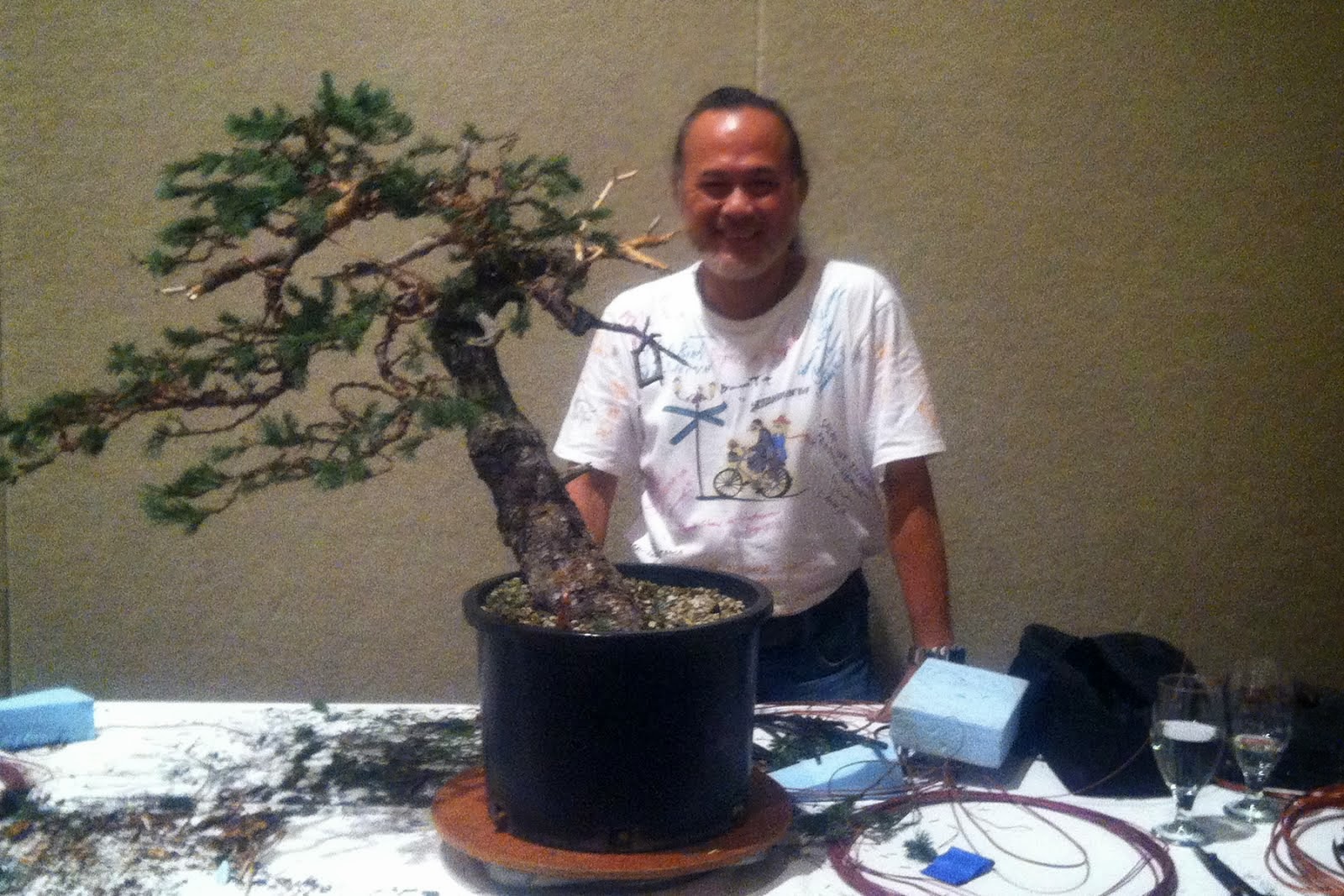
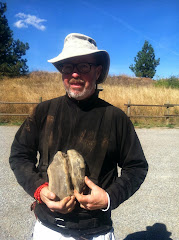
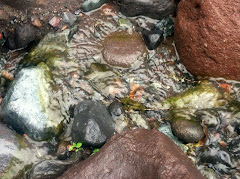

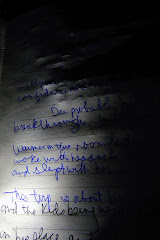

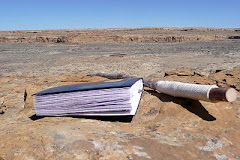
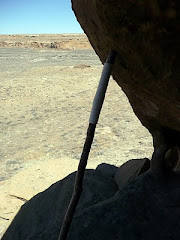

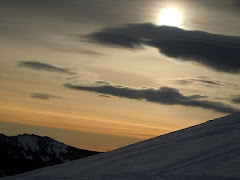
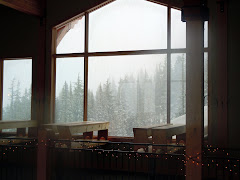


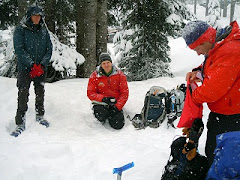
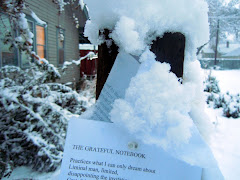

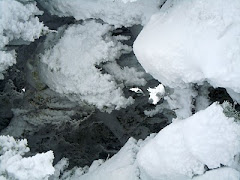
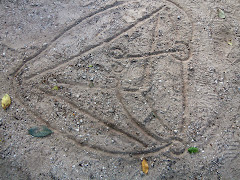
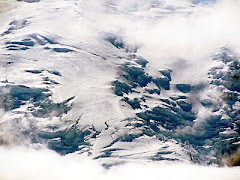











No comments:
Post a Comment